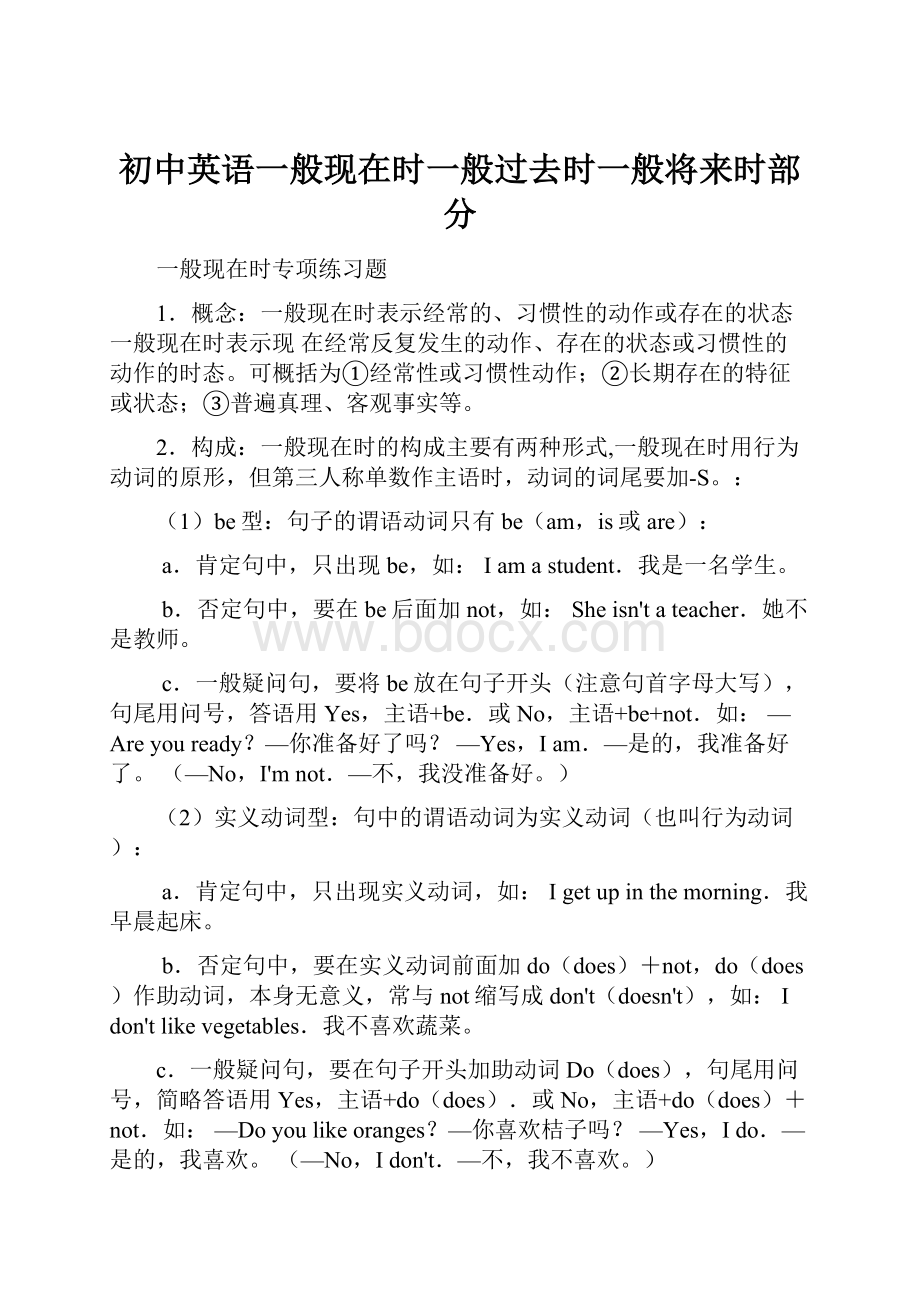初中英语一般现在时一般过去时一般将来时部分.docx
《初中英语一般现在时一般过去时一般将来时部分.docx》由会员分享,可在线阅读,更多相关《初中英语一般现在时一般过去时一般将来时部分.docx(19页珍藏版)》请在冰豆网上搜索。

初中英语一般现在时一般过去时一般将来时部分
一般现在时专项练习题
1.概念:
一般现在时表示经常的、习惯性的动作或存在的状态一般现在时表示现在经常反复发生的动作、存在的状态或习惯性的动作的时态。
可概括为①经常性或习惯性动作;②长期存在的特征或状态;③普遍真理、客观事实等。
2.构成:
一般现在时的构成主要有两种形式,一般现在时用行为动词的原形,但第三人称单数作主语时,动词的词尾要加-S。
:
(1)be型:
句子的谓语动词只有be(am,is或are):
a.肯定句中,只出现be,如:
Iamastudent.我是一名学生。
b.否定句中,要在be后面加not,如:
Sheisn'tateacher.她不是教师。
c.一般疑问句,要将be放在句子开头(注意句首字母大写),句尾用问号,答语用Yes,主语+be.或No,主语+be+not.如:
—Areyouready?
—你准备好了吗?
—Yes,Iam.—是的,我准备好了。
(—No,I'mnot.—不,我没准备好。
)
(2)实义动词型:
句中的谓语动词为实义动词(也叫行为动词):
a.肯定句中,只出现实义动词,如:
Igetupinthemorning.我早晨起床。
b.否定句中,要在实义动词前面加do(does)+not,do(does)作助动词,本身无意义,常与not缩写成don't(doesn't),如:
Idon'tlikevegetables.我不喜欢蔬菜。
c.一般疑问句,要在句子开头加助动词Do(does),句尾用问号,简略答语用Yes,主语+do(does).或No,主语+do(does)+not.如:
—Doyoulikeoranges?
—你喜欢桔子吗?
—Yes,Ido.—是的,我喜欢。
(—No,Idon't.—不,我不喜欢。
)
3,一般现在时的用法
1)经常性或习惯性的动作,常与表示频度的时间状语连用。
时间状语:
every…,sometimes,at…,onSundayIleavehomeforschoolat7everymorning.
2)客观真理,客观存在,科学事实。
Theearthmovesaroundthesun.ShanghailiesintheeastofChina.
3)表示格言或警句中。
Pridegoesbeforeafall.骄者必败。
注意:
此用法如果出现在宾语从句中,即使主句是过去时,从句谓语也要用一般现在时。
例:
Columbusprovedthattheearthisround..
4)现在时刻的状态、能力、性格、个性。
Idon'twantsomuch.AnnWangwritesgoodEnglishbutdoesnotspeakwell.
比较:
NowIputthesugarinthecup.Iamdoingmyhomeworknow.第一句用一般现在时,用于操作演示或指导说明的示范性动作,表示言行的瞬间动作。
再如:
Nowwatchme,Iswitchonthecurrentandstandback.第二句中的now是进行时的标志,表示正在进行的动作的客观状况,所以后句用一般现在时-
表达方法主要通过谓语动词的变化和用时间词语来表示,其中最主要的是谓语动词的变化。
现在一般时动词变化的规则是:
1.如果主语是名词复数和第一人称I、we,谓语动词不用做任何变化,即仍然用动词原型表示:
Weusuallygotoschoolat7:
30.我们通常7:
30上学去。
[go]Myparentsgivetenyuantomysistereveryweek.我父母每星期给我妹妹十元钱。
[give]
2.主语是任何一个单数名词或者是第三人称单数,谓语动词要进行必要的变化。
特别提一点:
不可数名词也算作单数处理。
3.谓语动词的变化规律是:
(1)在动词后加-s,-esread-reads,write-writes,say-says
(2)以s,x,ch,sh结尾的词加-esteach-teaches,wash-washes,guess-guesses
(3)以辅音字母+y结尾的词变y为i再加-estry-tries,carry–carries
(4)特殊变化的词be(是)-am,is,areIamshe/he/it,名词单数都用iswe,you,they,名词复数都用arehave(有)-have,hasI,we,you,they,名词复数都用haveshe/he/itis,名词单数都用has
(5)助动词,不论单复数、不论什么人称都没有变化,都用can,may,must,need,oughtto等。
而且,句子中有了助动词,谓语动词就不需要有任何变化了,即用动词原形表示。
请看下面的例子:
Lucyisathomenow.露茜现在在家。
Wehavesixclasseseveryday.我们每天上六节课。
Ioftengetupat6:
30.我经常6:
30起床。
JacklikesChinesefoodverymuch.杰克很喜欢中国饮食。
Wecanseesomepicturesonthewall.我们能看到墙上的画
(一)单选:
1.WhereLucycomefrom?
A.doB.doesC.isD.are
2.MostofthestudentsChina.
A.comesfromB.isfromC.arefromD.comeof
3.WespeakEnglish.
A.everydaysB.everydayC.verydayD.everyday
4.Mymathteacherabigpairofglasses.
A.wearsB.putonC.wearD.putson
5.Whatyourfatherandmother?
A.does,doB.do,doC.are,doD.do,does
(二)用动词适当形式填空:
1.Hisradioisbroken.It(sound)terrible.
2.Didsomebodydropwaterontherug?
It(look)wet.
3.Everyyearmyparents(give)meapresentformybirthday.
4.Theclub(send)heralettereverymonth.
5.yourdad(wash)hiscaronceaweek?
Yes,hedoes.
6.LinTaoisagoodstudent.He(study)veryhard.
7.They(work)atthebank.
(三)句型转换:
1.Mylivingroomhasthreewindows.(改为否定句)2.JimandJacklikeswimmingonSundays.(就划线部分提问)3.Weareinthesameclass.(改为一般疑问句)4.HecomesfromEngland.(就划线部分提问)一、用所给动词的适当形式填空。
1.Ioften(help)mymotherwithhousework.
2.UncleWang(introduce)hisdaughtertous
.3.He(have)musicclassinMondays.
4.How(do)he(get)there?
5.(do)you(agree)withme?
6.Allofus(study)hard.
7.Healways(forget)toclosethewindow.
8.Grandmaoften(cook)dinnerforourfamily.
二、填空。
Mrs.Black’sDay
Mrs.Blackoften(get)upat7:
00onSundaymorning.She(have)breakfastat8:
30.She(have)alittledog.She(like)togototheparkwithherdog.At10:
50,Mrs.Blacksometimes(wash)herclothes.At3:
00p.m.sheusually(go)shopping.Sheoften(make)supperat6:
00p.m.Shedoesn’t(watch)TVatnight.She(go)tobedatabout10:
30p.m.
一般现在时用法专练(A)
Ⅰ.用括号内动词的适当形式填空。
1.Heoften(have)dinnerathome.
2.DanielandTommy(be)membersoftheReadingClub.
3.SheandI(take)awalktogethereveryevening.
4.There(be)somewaterinthebottle.
5.We(notwatch)TVonweekdays.
6.Nick(notdo)hishomeworkonSundays.
7.they(like)theWorldCup?
8.Whattheyusually(do)onholidays?
9.yourparents(read)newspaperseveryday?
10.Thegirl(teach)usEnglishonSundays.
Ⅱ.按照要求改写句子。
1.DanielwatchesTVeveryevening.(改为否定句)DanielTVeveryevening.2.Idomyhomeworkeveryday.(改为一般疑问句并作否定回答)——youhomeworkeveryday?
——No,I.
3.Shelikesmilk.(改为一般疑问句并作肯定回答)
——shemilk?
——Yes.,shedoes.
4.SimonisfromBeijing.(同义句改写)SimonBeijing.
5.MillieiscleveratMaths.(同义句改写)MillieMaths.
Ⅲ.改错。
1.IsyourbrotherspeakEnglish?
ABC()
2.Doeshelookslikehisfather?
ABC()
3.Helikesplaygamesafterclass.
ABC()
4.MrWuteachsusEnglish.
ABC()
5Shedoesn'therhomeworkonSundays.
ABC()
Ⅳ.将下列句子译成英文。
1._桑迪放学后打羽毛球吗?
不.她学习很用功.放学后她总是看书..
_Sandybadmintonafterschool?
No.Shehard.Shealwaysbooksafterschool.
2.他在第三中学上学.他每天早上七点上学.
HeinNo.3MiddleSchool.Hetoschoolat7a.m.everyday.
3.父亲早晨送我到学校.
Myfathermetoschoolinthemorning.
4.我女儿喜欢看电视和听音乐..
MydaughterTVandtomusic.
5.西蒙朋友的姐姐长大后想当一位歌手.
Simon’sfriend’ssistertoasingerwhensheup.
一般现在时用法专练
一用所给动词正确形式填空
1.Heloves______________(read)newspaper.
2.Nickgoes_____________(swim)everySaturdayafternoon.
3.Simonenjoys___________(play)football.
4.MrMulikes___________(walk)afterschool.
5.Amylikes___________(talk)onthephonewithherfriends.
6.Simonusuallygoes____________(run)forhalfanhour.
7.Sandyenjoys____________(look)forthingsontheInternet.
8.Idon’tlike_____________(dance).
9.Ericisamemberofthe____________(read)Club.
10.It’safineday.Whatabout____________(play)badmintoninthepark?
四、BE动词填空。
1.________youLiFen?
No,not.
2.Mr.greenverybusy?
Yes,he.
3.Hemustathome.
4.Comedyveryinteresting.
5.Whatclassyouin?
6.YouandIgoodfriends.
7.Hisfriendsveryfunny.
8.Thetwinsveryhappybecausetheywanttogotoamovie.
五.用所给动词的适当形式填空。
1.Myclassmate(know)themanonthebike.
2.Hissisterusually(go)toschoolat7:
00am.
3.LinTao________(like)hisnewsweater.
4.Letme(have)alook.
5.Let’s(play)tennis!
6.________he(like)English?
7.Iwant(go)toamovie.
8.He(notknow)theteacher’sname.
9.Nice________(meet)you!
10.CanI________(ask)thepoliceman?
11.(sit)downand(have)acupoftea.
12.________(notlook)atyourbook!
13.________you(cansee)thebananasonthetable?
14.Ineed(buy)somenewclothes.
初中英语一般过去时知识讲解与训练
第一部分:
知识讲解
1.一般过去时表示过去某个时间发生的动作或存在的状态,常和表示过去的时间状语连用。
一般过去时也表示过去经常或反复发生的动作。
2.Be动词在一般过去时中的变化:
⑴am和is在一般过去时中变为was。
(wasnot=wasn’t)
⑵are在一般过去时中变为were。
(werenot=weren’t)
⑶带有was或were的句子,其否定、疑问的变化和is,am,are一样,即否定句在was或were后加not,一般疑问句把was或were放到句首。
3.句中没有be动词的一般过去时的句子否定句:
didn’t+动词原形,如:
Jimdidn’tgohomeyesterday.一般疑问句:
在句首加did,句子中的动词过去式变回原形。
如:
DidJimgohomeyesterday?
特殊疑问句:
⑴疑问词+did+主语+动词原形?
如:
WhatdidJim动词过去式变化规则:
1.一般在动词末尾加-ed,如:
pull-pulled,cook-cooked
2.结尾是e加d,如:
taste-tasted
3.末尾只有一个元音字母和一个辅音字母的重读闭音节,应双写末尾的辅音字母,再加-ed,如:
stop-stopped
4.以“辅音字母+y”结尾的,变y为i,再加-ed,如:
study-studied
5.不规则动词过去式:
am,is-wasare-were,do-did,see-saw,say-saidgive-gave,get-got,go-went,come-came,have-had,eat-ate,take-took,run-ran,sing-sang,put-putdoyesterday?
make-made,read-read,write-wrote,draw-drew,drink-drank,fly-flew,ride-rode,speak-spoke,sweep-swept,buy-boughtswim-swam,sit-satbring--broughtcan-couldcut-cutbecome-becamebegin-begandraw-drewfeel-feltfind-foundforget-forgothear-heardkeep-keptknow-knewlearn-learnt(learned)leave-leftlet-letlose-lostmeet-metread-readsleep-sleptspeak-spoketake-tookteach-taughttell-toldwrite-wrotewake-wokethink-though
第二部分:
练习
过去时练习:
写出下列动词的过去式
is\am_________fly_______plant________are________drink_________play_______go________make________does_________dance________worry________ask_____taste_________eat__________draw________put______throw________kick_________pass_______do________
一、用be动词的适当形式填空。
1.I______anEnglishteachernow.
2.She_______happyyesterday.
3.They_______gladtoseeeachotherlastmonth.
4.HelenandNancy________goodfriends.
5.Thelittledog_____twoyearsoldthisyear
6.Look,there________lotsofgrapeshere.
7.There________asignonthechaironMonday.students______veryexcited.
8.Today_____thesecondofJune.Yesterday______thefirstofJune.It_____Children’sDay.Allthestudents______veryexcited.
二、句型变换。
1Therewasacarinfrontofthehousejustnow.
否定句:
_________________________________________
一般疑问句:
___________
肯定回答:
___________否定回答:
__________
2Theyplayedfootballintheplayground.
否定句:
________________________________________________
一般疑问句:
___________
肯定回答:
___________否定回答:
__________
三、用所给动词的适当形式填满空白
1.I______(watch)acartoononSaturday.
2.Herfather_______(read)anewspaperlastnight.
3.We_________tozooyesterday,we_____tothepark.(go)
4.______you_______(visit)yourrelativeslastSpringFestival?
5.______he_______(fly)akiteonSunday?
Yes,he______.
6.GaoShan_______(pull)upcarrotslastNationalDayholiday.
7.I____________(sweep)theflooryesterday,butmymother______.
8.What_____she_____(find)inthegardenlastmorning?
She____(find)abeautifulbutterfly.
9.It____(be)Ben’sbirthdaylastFriday
10.Weall___(have)agoodtimelastnight.
11.He_____(jump)